Keynote Speakers
Cooperation in Cellular Networks: Taking a new look at interference |
||||
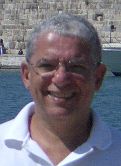 |
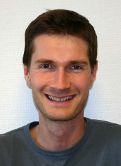 |
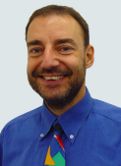 |
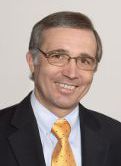 |
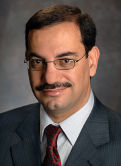 |
Paulo S. R. Diniz |
David Gesbert |
Andreas Mitschele-Thiel |
Josef A. Nossek |
Ali H. Sayed |
Keynote Details

High-Throughput Block Transceivers
Paulo S. R. Diniz
Abstract
The standard designs of multicarrier and single-carrier transceivers employing frequency-domain equalization require an amount of redundancy of at least the order of the channel. This redundancy eliminates the inherent inter-block interference (IBI), and allows the exploitation of the resulting channel matrix to design superfast zero-forcing (ZF) and minimum mean squared error (MMSE) equalizers.
Although it is well known that the minimum redundancy for IBI-free designs of fixed and memoryless transceivers is around half of the channel order, all practical solutions do not employ minimum redundancy. This presentation introduces in a unified way a family of block transceivers with superfast implementation employing a range values for the redundancy starting from the minimum. The related designs of practical ZF and MMSE transceivers are presented and their performances are compared in terms of throughput for fixed bit-error rate.
The main feature of the proposed transceivers is their higher throughput allowing the use of the wireless and wired channels more effectively.
Biography
Paulo S. R. Diniz received Ph.D. degree from Concordia University, Canada, and is a full Professor at the Federal University of Rio de Janeiro (UFRJ) in Brazil. He served as Undergraduate Course Coordinator and as Chairman of the Graduate Department. He is one of the three senior researchers and coordinators of the National Excellence Center in Signal Processing. He has also received the Rio de Janeiro State Scientist award, from the Governor of Rio de Janeiro state. He has published several refereed papers in some of these areas and wrote two books ADAPTIVE FILTERING: Algorithms and Practical Implementation, Springer, Third Edition 2008, and DIGITAL SIGNAL PROCESSING: System Analysis and Design Cambridge University Press, Cambridge, UK, Second Edition 2010 (with E. A. B. da Silva and S. L. Netto).
He served as the Technical Program Chair of the 1995 MWSCAS and SPAWC-2008. He also served as Vice President for region 9 of the IEEE Circuits and Systems (CAS) Society and as Chairman of the DSP technical committee of the same Society. He is also a Fellow of IEEE and the general co-chair of IEEE ISCAS-2011. He served as associate editor for the following Journals: IEEE Transactions on Circuits and Systems II: Analog and Digital Signal Processing from 1996 to 1999, IEEE Transactions on Signal Processing from 1999 to 2002, and the Circuits, Systems and Signal Processing Journal from 1998 to 2002. He was a distinguished lecturer of the IEEE CAS and Signal Processing Societies, and received the 2004 Education Award of the IEEE CAS Society. He has also received some best paper awards, including the Guillemin-Cauer award from the IEEE CAS Society.

Cooperation in Cellular Networks: Taking a new look at interference
David Gesbert
Abstract
As it is well known to wireless system designers, fading limits the reliability of point to points radio links while interference limits their spatial reusability.
As the performance of practical point to point links is now approaching its fundamental log(1+SNR) rate limit, increasing further the capacity of wireless systems will require the adoption of a new truly multi-terminal view of the network, i.e. a view where the impact of interference is fully accounted for in the design of transmission algorithms. This is in contrast with traditional designs, where interference has been dealt with a combination of resource allocation protocols at the link layer (with soft to hard orthogonality constraints) together with robust coding and detection schemes at the PHY layer. Recent results in the domain of cooperative communications have revealed however that interference can be efficiently tackled, or even exploited, via a proper treatment at the transmitter side, involving the concept of coordination among the interfering transmitters, as in so-called network MIMO or interference alignement to name a few examples of popular methods. In this talk we emphasize the promise of such methods, yet also how the coordination gains come at a substantial price in terms of exchanging information across the devices. After giving an overview comparing such techniques, we are addressing the coordination gain/cost trade-off. Finally we look at some promising research avenues in the domain of distributed interference avoidance and exploitation.
Biography
David Gesbert (IEEE SM) is Professor in the Mobile Communications Dept., EURECOM, France, where he heads the Communications Theory Group. He obtained the Ph.D degree from Ecole Nationale Superieure des Telecommunications, France, in 1997. From 1997 to 1999 he has been with the Information Systems Laboratory, Stanford University. In 1999, he was a founding engineer of Iospan Wireless Inc, San Jose, Ca.,a startup company pioneering MIMO-OFDM (now Intel). Before joining EURECOM, he has been with the Department of Informatics, University of Oslo. D. Gesbert has published about 170 papers and several patents all in the area of signal processing, communications, and wireless networks.
D. Gesbert was a co-editor of several special issues on wireless networks and communications theory, for JSAC (2003, 2007, 2009), EURASIP Journal on Applied Signal Processing (2004, 2007), Wireless Communications Magazine (2006). He served on the IEEE Signal Processing for Communications Technical Committee, 2003-2008. He's an associate editor for IEEE Transactions on Wireless Communications and the EURASIP Journal on Wireless Communications and Networking. He authored or co-authored papers winning the 2004 IEEE Best Tutorial Paper Award (Communications Society) for a 2003 JSAC paper on MIMO systems, 2005 Best Paper (Young Author) Award for Signal Proc. Society journals, and the Best Paper Award for the 2004 ACM MSWiM workshop. He co-authored the book 'Space time wireless communications: From parameter estimation to MIMO systems', Cambridge Press, 2006.

Self-organization in Mobile Communication Systems
Andreas Mitschele-Thiel
Abstract
Today's mobile communication systems are highly static and inflexible with regard to changes. This prevents the fast implementation of innovative ideas as well as the fast adaptation to changes of the environment, e.g. to changing service demands, changing traffic loads or traffic distributions in mobile environments.
The talk will give an overview on the research issues addressed by the International Graduate School on Mobile Communications at the Ilmenau University of Technology. The School, currently comprising 9 professors and 30 doctoral students, is focusing on interdisciplinary topics in mobile communications, especially the application of methods for self-organization to allow for the automatic recovery of communication systems from natural disasters or terrorist attacks.
The research goal of the School is to develop mechanisms for the autonomous, dynamic, distributed coordination (self-organization) of future mobile communication systems. We apply self-organization to the radio system, to protocols and the network as a whole. Our specific application scenarios are disaster networks, requiring an aggressive approach to network operation. The coordinated adaptation of radio, protocols and network aspects is essential to provide communication services in disaster scenarios, e.g. the localization of individuals or to support emergency communication.
Biography
Andreas Mitschele-Thiel is a full professor at the Ilmenau University of Technology, Germany, and head of the Integrated Communication Systems group. In addition, he is the head of the International Graduate School on Mobile Communications of the University. 2005 to 2009, he also served as Dean for the Faculty for Computer Science and Automation. In addition, he is co-founder and scientific director of two research spin-offs of the university: Cuculus is a leader in open service platforms for smart metering and home automation. IDEO Laboratories is focusing on VoIP-based telecommunications.
He received a Diploma in Computer Engineering from the Fachhochschule Esslingen in 1985, a M.S. in Computer and Information Science from The Ohio State University in 1989 and a Doctoral degree in Computer Science from the University of Erlangen in 1994. He completed his habilitation in Computer Science at the University of Erlangen in 2000. 1996 to 2000 he served as head of the research group on Design Methodologies at the University of Erlangen. During this period he also served as Associated Rapporteur at the International Telecommunication Union (ITU) where he was responsible for Time and Performance in SDL.
Andreas Mitschele-Thiel has held various positions in the telecommunication industry. 2000 to 2003 he was with the Wireless Advanced Technologies Lab of Lucent Technologies. At Lucent he served as project manager for the IPonAir project, focusing on the evolution of 3G systems, funded by the German Ministry for Education and Research. Prior to this he has held various positions at Alcatel.

Do Communication Engineers Need Circuit Theory?
Josef A. Nossek
Abstract
Do communication and information engineers get the physics right in their models? Do the basic model structures adequately translate physical reality? These are the central questions which will be addressed in this lecture.
The high level of abstraction taken by information theory makes it a very versatile and powerful tool for the analysis and optimization of communications systems. But information theory has no concept of the flow of energy that accompanies the flow of information. Therefore, some important aspects of communication systems such as transmit power or noise covariance can by no means be straightforwardly mapped from the information theoretic context to technical reality. An effective method will be presented to complement information theory with such a mapping by applying classical circuit theory. This allows correct assessment of the energy flow in a communication system and thereby enables an information theoretic analysis and optimization which is consistent with the underlying physics. After developing appropriate circuit theoretic channel models, the potential performance of multi-antenna communication systems will be analyzed and surprising new results and insights will be revealed.
Biography
Josef A. Nossek (S'72--M'74--SM'81--F'93) received the Dipl.-Ing. and the Dr. techn. degrees in electrical engineering from the University of Technology in Vienna, Austria in 1974 and 1980, respectively. In 1974 he joined Siemens AG in Munich, Germany as a member of technical staff, in 1978 he became supervisor, and from 1980 on he was Head of Department. In 1987 he was promoted to be Head of all radio systems design. Since 1989 he has been Full Professor for circuit theory and signal processing at the Munich University of Technology where he teaches undergraduate and graduate courses on circuit and systems theory and signal processing and leads research on signal processing algorithms for communications, especially multiantenna systems. He was President Elect, President and Past President of the IEEE Circuits and Systems Society in 2001, 2002 and 2003 respectively. He was Vicepresident of VDE (Verband der Elektrotechnik, Elektronik und Informationstechnik e.V.) 2005 and 2006, President of VDE 2007 and 2008 and is Vicepresident again in 2009 and 2010.. His awards include the ITG Best Paper Award 1988, the Mannesmann Mobilfunk (now Vodafone) Innovations award 1998, the Award for Excellence in Teaching from the Bavarian Ministry for Science, Research and Art in 1998. From the IEEE Circuits and Systems Society he received the Golden Jubilee Medal for 'Outstanding Contributions to the Society' in 1999 and the Education Award in 2008. In 2008 he also received the Order of Merit of the Federal Republic of Germany and in 2009 he has been elected member of the German National Academy of Engineering Sciences (acatech).

Adaptive Networks and Bio-Inspired Cognition
Ali H. Sayed
Abstract
The emerging interest in cognitive networks, smart grids, and self-organizing networks is motivating heightened research on collaborative processing strategies that enable networks to learn and respond to information in real-time. Adaptive networks are well-suited to perform decentralized information processing and decentralized inference tasks. They are also well-suited to model self-organizing behavior such as animal flocking and swarming. These networks avoid centralized processing and perform in-network inference and control decisions without relying on omnipotent agents (or fusion centers). This is because solutions that rely on information fusion are not scalable, are hard to adapt to changing network conditions, and create single points of vulnerability and information bottlenecks.
Adaptive networks consist of spatially distributed agents that are linked together through a connection topology. The topology may vary with time and the nodes may also move. The agents cooperate with each other through local interactions and by means of in-network processing. The diffusion of information across the network results in various forms of self-organizing behavior and collective intelligence. A key property of adaptive networks is that all agents behave in an isotropic manner and are assumed to have similar abilities. This kind of behavior is common in many socio-economic and life and biological networks where no single agent is in command.
This talk describes recent developments in distributed processing over adaptive networks and illustrates the techniques by studying self-organization in biological networks such as bird formations, fish schooling, bee swarming, and bacteria motility.
Biography
Ali H. Sayed is Professor and Chairman of Electrical Engineering at UCLA where he directs the Adaptive Systems Laboratory (www.ee.ucla.edu/asl). He has published widely in the areas of adaptation and learning with over 300 articles and 5 books. He is the author of the textbooks Fundamentals of Adaptive Filtering (Wiley, NJ, 2003), and Adaptive Filters (Wiley, NJ, 2008). He is a Fellow of IEEE and has served as Editor-in-Chief of the IEEE Transactions on Signal Processing (2003-2005) and the EURASIP J. Advances in Signal Processing (2006-2007). His research has received several recognitions including the 1996 IEEE D. G. Fink Prize, a 2002 Best Paper Award from the IEEE Signal Processing Society, the 2003 Kuwait Prize, the 2005 Terman Award, a 2005 Young Author Best Paper Award from the IEEE Signal Processing Society, and two Best Student Paper Awards at international meetings (1999,2001). He served as a 2005 Distinguished Lecturer of the IEEE Signal Processing Society. He has been a member of the Publications (2003-2005), Awards (2005), and Conference (2007-present) Boards of the IEEE Signal Processing Society. He served as General Chairman of ICASSP 2008, as member of the Board of Governors (2007-2008) of the IEEE Signal Processing Society, and is now serving as Vice-President (Publications) of the same society (2009-present).




